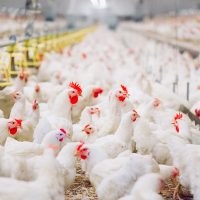Inducing Heat Stroke In Animals: Ethical Issue For Veterinarians

Many farmers are dealing with rapidly spreading diseases affecting their chickens and pigs. When bird flu, swine flu, and other diseases threaten a large population of farm animals, what is the proper action to take?
Many farmers have been engaging in depopulation, or the rapid destruction of animals due to urgent circumstances. One thing farmers have been doing is inducing heat stroke in these animals. One way they are doing so is using a method called “ventilation shutdown plus.” This involves turning off the airflow in a barn and cranking up the temperature to as high as 120 degrees Fahrenheit. The animals are trapped and eventually die from heat stroke.
When the avian flu broke out in 2022, it is estimated that more than 57 million chickens were killed, most of them by ventilation shutdown plus. There is concern that with African swine fever now a threat, many farmers will use this method to kill infected pigs as well.
Ventilation shutdown plus is a controversial method to kill animals, as these heat stroke-based methods compromise animal welfare. Plus, even though this depopulation method can be quick and effective, it can result in prolonged suffering for some animals in cases where death takes hours. There is also concern that this method does not always achieve 100% mortality, so it certainly does not qualify as euthanasia.
Another problem is that farmers are sometimes using ventilation shutdowns on healthy animals. There is also information that suggests that this method is painful and can lead to burns.
Another issue to consider is that animals are not suffering from disease and they cannot transmit the disease to others. However, the animals are still being killed because the modern animal agriculture industry often puts profits over the well-being of animals and workers. It provides animals the lowest level of care required and provides minimal health and safety protections to its workers.
Another issue to keep in mind is that in 2019, The American Veterinary Medical Association (AVMA) classified heat stroke-based killing methods as “permitted under constrained circumstances.” This classification of ventilation shutdown plus is used to justify this method’s widespread use.
The U.S. veterinary profession has an ethical responsibility to protect animal welfare, so this is concerning. It is recommended that the AVMA revise its guidelines and encourage more humane methods of depopulation. In the last two years, more than 1,500 veterinary professionals have petitioned the AVMA to classify ventilation shutdown as “not recommended,” but have been unsuccessful thus far.
Keep Your License With Help From a Tampa Veterinarian Licensing Lawyer
Intentionally killing any animal is an ethical issue that everyone — not just veterinarians — should take note of.
When diseases threaten large populations of animals, it can be hard to know what to do next. Should the animals just suffer? Ethical issues can cause administrative problems. Get help from a Tampa veterinarian licensing lawyer from The Law Offices of David P. Rankin, P.A. To schedule a consultation, fill out the online form or call (813) 968-6633.
Source:
awionline.org/press-releases/new-research-mass-killing-farm-animals-heat-stroke-demands-action-veterinary

